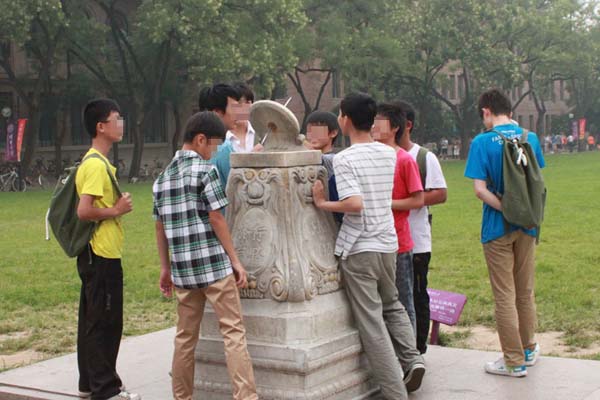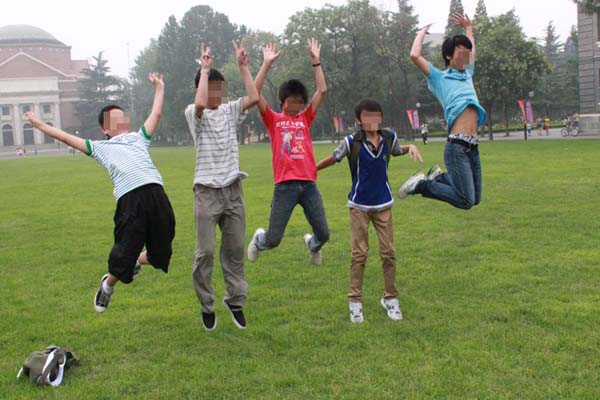Troubled kids inspired by Tsinghua's legacy
- By Wu Jin
 0 Comment(s)
0 Comment(s) Print
Print E-mail China.org.cn, July 27, 2012
E-mail China.org.cn, July 27, 2012
Children from AIDS-affected villages in Henan Province got a dose of inspiration at Tsinghua University, last Thursday.
Their visit to the former royal garden-turned-university was the eighth leg of their week-long summer campus, which began on July 16 and was organized by the Chi Heng Foundation. During their visit, the children discovered that the university’s history was both inspiring and pertinent to their own often difficult circumstances.
 |
|
Teenagers on a summer camp sponsored by the Hong Kong Chi Heng Foundation inspect a sundial at Tsinghua University in Beijing on Thursday July 19, 2012. The teenagers are from AIDS-impacted families in Henan Province. [Pang Li/China.org.cn] |
Their first port of call was the famous sundial in front of the university’s symbolic great hall, which was built in 1917. Inscribed with the motto "Actions, not words", both in Chinese ("行胜于言") and Latin ("Fagta non verba"), the timekeeping device was presented to the university by its alumni in 1923, and is part of a great heritage and history which has subsequently been drilled into generations of the university's students.
Tsinghua, which in early 1910s housed China’s first cistern, was the country's first preparatory school built from the proceedings of the Boxer Indemnity Scholarship Fund and was attended by students hoping to further their education in the United States.
Yuan Xiaowen, a volunteer guide from the Tsinghua Red Cross, the university's independent philanthropic organization, commented that the university’s origins are rooted in hardship and shame. "It was actually founded on grim humiliation," he said.
The university's early students, depressed by China’s seemingly faltering culture and power, would rouse themselves by shouting what became their motto: "Relentless efforts on self-striving and boundless integrity for knowledge and contribution!" The motto is a revised excerpt from "Yi Jing," the classic Chinese text "The Book of Changes," and it subsequently became the university’s enduring tenet.
 |
|
Teenagers on a summer camp sponsored by the Hong Kong Chi Heng Foundation take time out for some fun on the campus of Tsinghua University in Beijing on Thursday July 19, 2012. The teenagers are from AIDS-impacted families in Henan Province. [Pang Li/China.org.cn] |
It became clear that the camp participants shared something of a common bond with Tsinghua. "I was told about Tsinghua at home, but the information was far less comprehensive than I have realized today," said Xiao Hui (alias), after observing the sundial.
"Things can only be done when you resort to your own ability," he added.
The university, being well aware of the children’s disadvantaged backgrounds, prepared a presentation at which some of its former star students, who also battled difficult backgrounds and circumstances, regaled the camp participants with their own inspirational tales.
"I'm a left-behind child from a remote town in Guangxi [Zhuang Autonomous Region]," said Chen Chaosong, an "Outstanding Self-Striving Star" at Tsinghua who has spent much of his spare time working with various educational programs for children in poor areas.
Chen, who is now a postgraduate student at the university, added: "I was grievously ill during the crucial university entrance exam, and I thought it would prevent me from coming to Tsinghua."
He continued: "But when the result came out, my score ranked the second highest in Guangxi. [Through my experience], [I understand] hearts and the will to succeed count most in life and our abilities are honed by hardship."
Chen captured his philosophy in a succinct and memorable aphorism which he wrote on a blackboard: "Hard times provide access to success."
His words were echoed by Yan Wendian, a professor from the Automation School of the university and concurrently in charge of undergraduate enrollment. It was Yan who discovered Chen in the remote Guangxi village.
Yan lead the children in a rendition of the old Tsinghua campus song, choosing the first part of the song which ends with the words, "infinite strides require relentless self-made-efforts," reflecting both the university’s history and Chen's uplifting words. "I hope all of you can fulfill your dreams," Yan concluded.






Go to Forum >>0 Comment(s)